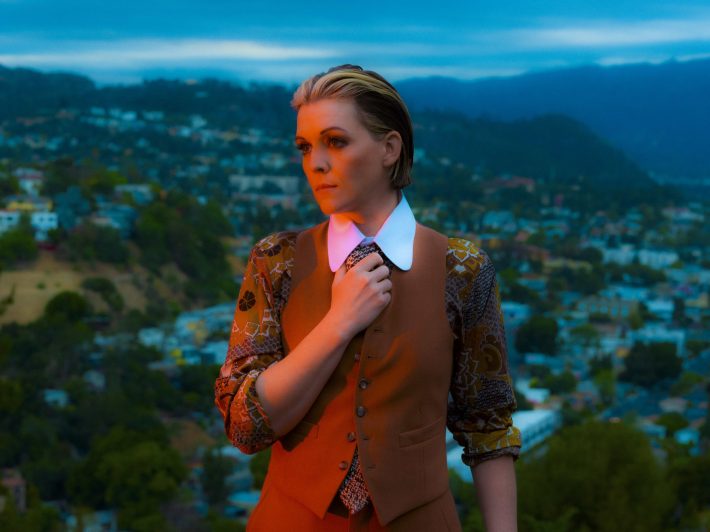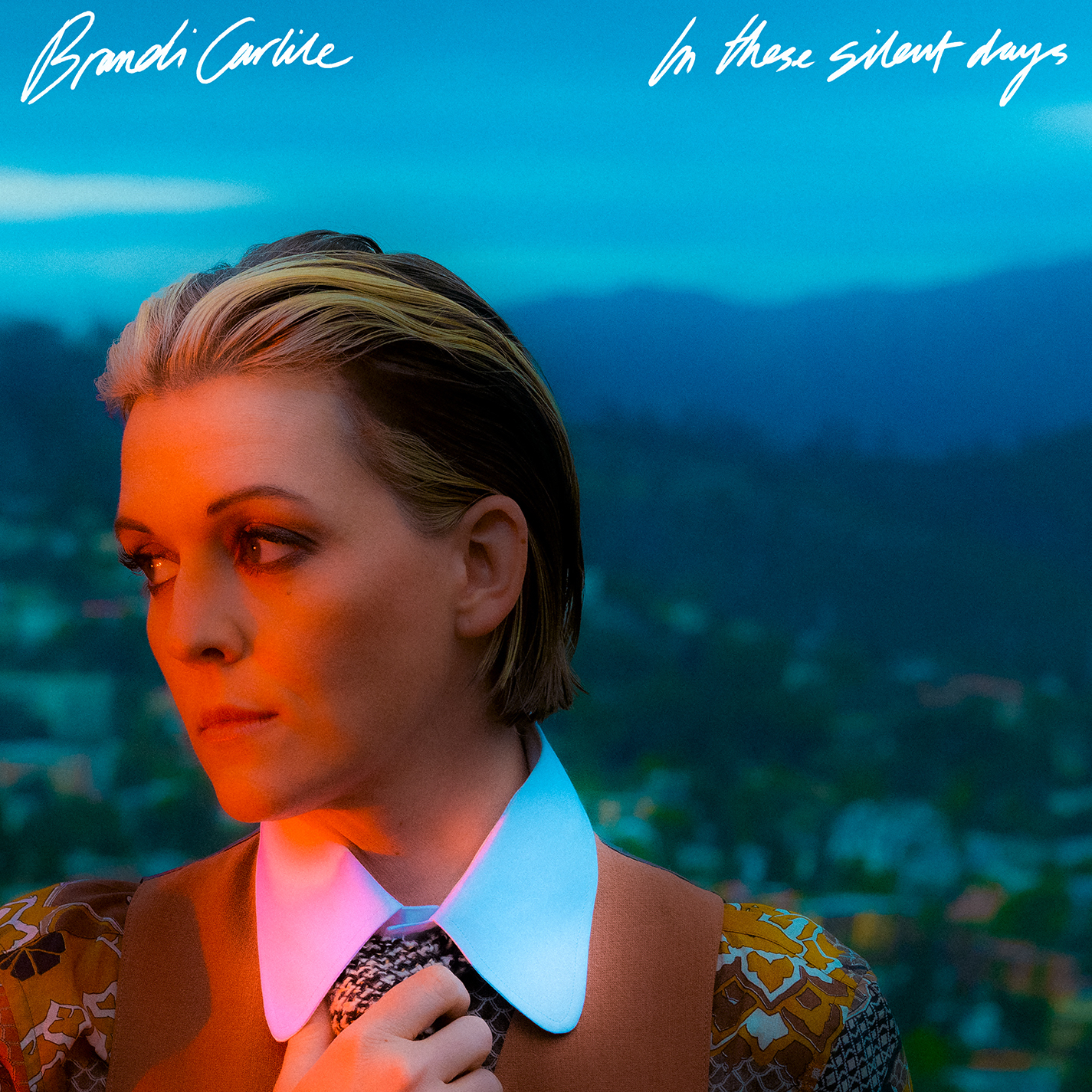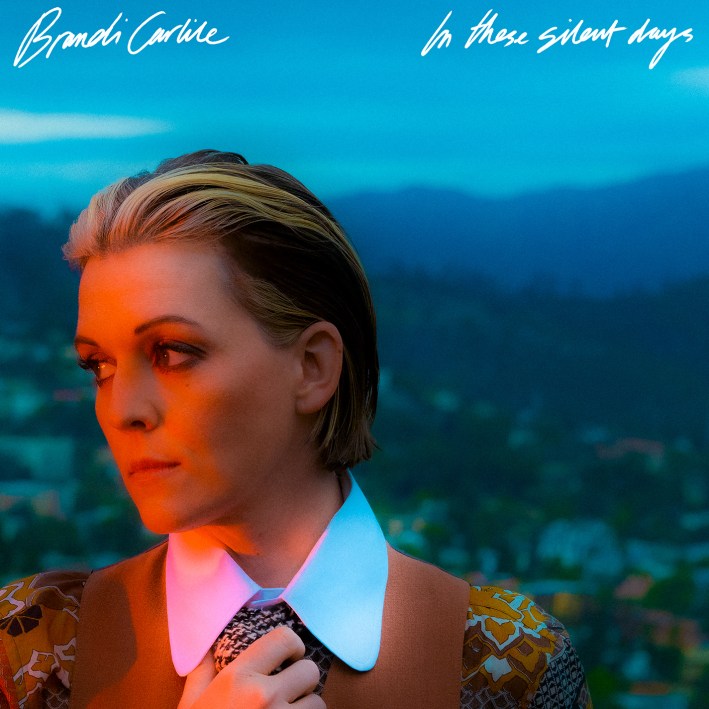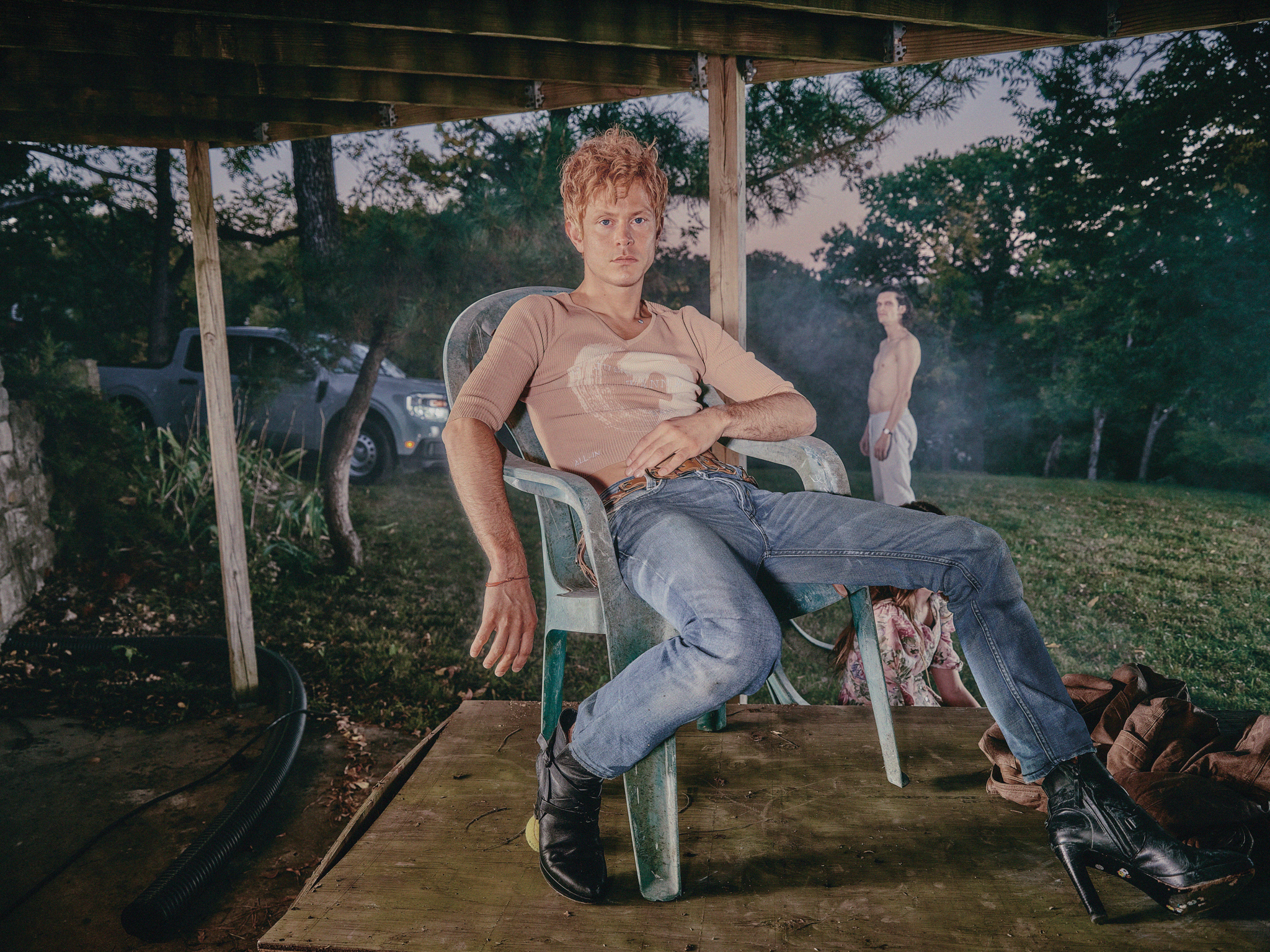When I ask Brandi Carlile how her day is going, she doesn’t just say "fine" or "good." She answers with such clear-eyed enthusiasm that I immediately understand why journalists fall all over themselves to impart just how real she is: "Man, it's been pretty awesome," Carlile says over the phone. "I just got back down off of two shows at Red Rocks, and I went out yesterday and learned how to drive my new boat. So I’m in pretty good juxtaposition of Gemini energy."
An ongoing pandemic notwithstanding, the country/Americana beacon has plenty more reason to feel good right now. Just a few months ago, Carlile released her New York Times Bestselling memoir, Broken Horses, and, wasting no time, wrote a companion album, In These Silent Days (out today via Low Country Sound/Elektra Records), which features the already-released power ballad “Right On Time.” Together with longtime collaborators and bandmates Tim and Phil Hanseroth, Carlile spent the bulk of COVID piecing those 10 songs together; the result is a towering collection that works through lingering trauma around religion (Carlile was raised Baptist in rural Washington) and the ensuing rejection over her coming out at age 15. At the same time, however, In These Silent Days is also a love letter to the vast support network of family and friends Carlile has assembled for herself as an adult.
Keep in mind, Carlile’s been at this a long time, having released her self-titled debut album in 2005 -- two years before breaking out with her 2007 single “The Story,” which was quickly snapped up to soundtrack Grey’s Anatomy. More than a decade later, Carlile exploded into the mainstream, scooping up multiple Grammys for 2017’s By The Way, I Forgive You and its monumental single “The Joke” and becoming buds with industry legends like Elton John, Dolly Parton, and Joni Mitchell. Today, she has built a remarkable reputation for writing sweeping roots-rock ballads that defy genre categorization and bring comfort to fans who might also feel out of step with heteronormative culture.
Still, given her substantial back catalog, it’s hard to believe that Carlile, who shares two children with her wife Catherine Shepherd, is only just now exploring the rich emotional terrain covered on In These Silent Days. This was a natural continuation of recording By The Way, I Forgive You, she says, a process that left her feeling “really opened up, spiritually.” Likewise, after writing Broken Horses, she says, “I went straight to the piano, and the flow continued.”
Ahead of releasing In These Silent Days, Carlile joined me for a track-by-track breakdown of her latest album, which touches on themes around family, legacy, religion, and giving herself permission to feel angry.
1. "Right On Time"
Why did it feel right to have “Right On Time” lead off the album, both as the first song and its lead single?
BRANDI CARLILE: Well, because I guess I see In These Silent Days as inextricably linked to By The Way, I Forgive You. And the reason for that is because I realized when I went in to record By The Way, I Forgive You -- Oh, my God. My 110-pound dog just came bounding in here. Let me get him out of here. Get!
When I went in to record By The Way, I Forgive You, I think I realized how shut down I was about making albums and recording in the studio. I think I just saw it as this obligatory way to sort of fuel up my bus and get me back on the road with more songs. And I just didn't know how to show genuine emotion without the audience. I didn't know how to lose myself in my vocal performances. I don't know if it's something I had unlearned or if I just didn't know, but by the end of the record, I was feeling really opened up spiritually, and it ended on “The Joke.”
It was like, lights out, we go home after “The Joke.” And I was like, "Shit. Man, I just got there." All the years went by, and the big things happened with “The Joke,” but I always knew in the back of my mind that I had to stop that process in the middle. So when I wrote “Right On Time,” I knew I was starting where “The Joke” left me off, and I wanted to start the album that way because that's what felt true to me.
I love that. And for the song’s video, I read in an interview that you ultimately chose Courteney Cox to direct “Right On Time” because she “really got it.” What was it about her concept that resonated with you, as opposed to the other ideas presented?
CARLILE: Well, first of all, we have a weird connection. [We have] a weird amount in common. I think people wouldn't necessarily think that, on the surface, I have a lot in common with Courteney Cox. But I do. It seems unlikely because she's an actor, and I'm unable to act in any scenario. It seems unlikely because she's really, really funny and feminine, and I'm kind of awkward and serious and not feminine. Those things aside, we have a weird amount in common in terms of how we walk through the world, constantly trying to bring people to us, to congregate in these kind of culty, ultra-responsible, can't-be-alone, won't-be-alone kind of way. We both take care of the people in our families, and we've got this intense connection whenever we get together. We have conversations where we're finishing each other's sentences.
When she heard “Right On Time,” I didn't even really know she did music videos. But she called me, and she was like, "I have a pitch. I have an idea." She basically acted out the video. She's a really good actor. People don't know how good a serious actor she is. She's really good in terms of playing a serious role or whatever. I just knew that she knew what the song was about without me telling her because of the way she was acting. I knew the shit she was making me do was going to stress me out and make me really uncomfortable, and the more uncomfortable it made me, the better it was for her.
That's funny because I do associate her with a music video, but not directing it, exactly...
CARLILE: Yes. Springsteen.
Feels oddly like a full-circle moment for Courteney.
It does, because probably if there's one person whose gratitude and energy I would like to espouse or have, it would be probably [Bruce Springsteen].
2."You And Me On The Rock"
CARLILE: I had just finished the book, and I was chronologically mining my really, really early memories. I remember Sunday school class about building your house on a rock as a little kids' Bible story about basically building your life on a solid foundation. That foundation I think in that situation would definitely be Jesus. There was a song about building your house on a rock, and there was a little picture you colored in about building your house on a rock.
When my life changed, when everything that I identify myself by went away, I was just kind of left with a question of, well, is what I've built my life on really a solid foundation? I turned to [my wife] Catherine and the girls, and I wrote that song, and I realized that, yeah, even the most intensely self-identifying things can go away, but what my life is really built on, which is faith and my family, it's a rock, and it's solid. And then I just used some of the textures, some of the things that were happening in my day, from me being in my garden and her taking her space and going on her walks. She's got the most beautiful English accent that I just could listen to even when she's bitching at me. I could listen to it all day. And I just realized that they're my foundation and that anything can change, and that won't.
What did that earlier foundation look like for you?
CARLILE: Well, I just think that when you're a kid and the first thing that happens when you pick up a guitar and learn to play a couple chords or open your mouth and sing a song is, the adults start telling you, "You better have a backup plan. I hope you have a plan B because the shit could hit the fan." I'm always just like, "Eh, fuck off." There is no plan B for an artist. But you always wonder. What if I get cancer? What if I break my back? What if I have a vocal hemorrhage, and my voice doesn't come back? Basically, what if my job goes away? What if the thing that makes me me just stops? It happens to people every day for all different reasons in their lives, but musicians and artists almost universally have that lecture many times in their life about this backup plan.
When the pandemic hit, it was like all of our nightmares just kind of ushered in. Nobody had a backup plan. We're artists. We don't have any money saved. We don't do that. It was scary because it makes you question whether or not you should've had a backup plan. Or what if the thing that makes me me goes away? Am I still me? Those were the questions that were in my mind. It's like I'm not going to get a round of applause for emptying the dishwasher. But I looked around, and then I saw that what made me me wasn't ever that.
How did Jess Wolfe and Holly Laessig from Lucius come aboard to sing back-up? Why did it feel right to have them on this song?
CARLILE: The song just felt really feminine to me. And I love singing with the [Hanseroth] twins. But I just felt like there's just something where I just didn't want men's voices on it. It happens about once an album. So I did the harmonies. But it just sounded like me over and over again. And then I produced the [new] Lucius album, which, holy... You've got to hear this thing. If you haven't heard it yet, it's just ridiculous. I got to sing with the girls on tons of the songs, and just the way our voices sounded together, I had already finished the record, and I recalled the mix because I wanted them to sing it. They sent back the harmonies, and I was doing backflips. I cranked them up loud.
3. "This Time Tomorrow"
Listening to “This Time Tomorrow,” it sounds like you’re solemnly leaving something behind.
CARLILE: It's basically exactly what you surmised. I live here on this rock, on this property, with the twins, our lives, and our kids, and we got six of them, seven now that my cellist married my wife's sister, and they've got a little baby, Amelia. So, seven kids now. We wake up every morning and look out the window at the same thing: Tiger Mountain. And we do that sort of metaphorically, too, because when somebody's parent passes away or goes to rehab, we all grieve together.
We had a COVID exposure at Thanksgiving, and all of our turkeys went in the garbage. [We] couldn't get together. So we basically were experiencing the same life. Sometimes I feel such debilitating empathy when they go through something. If their best friend commits suicide, I feel that in the depths of my soul, almost more than they do because I have perspective, you know? And so I sing a song like “Sugartooth” with my whole heart.
I know everything that's going on in our lives and everything that they're going through, and I'm going through it, too. So the way that we write right now is pretty humanly interchangeable. When Tim [Hanseroth] brought “This Time Tomorrow” to the table and the three of us put our voices onto it and our hearts into it, we knew we were basically creating an heirloom. We were basically creating a family heirloom for the seven, for the kids that, pray to God, are going to outlive us by a margin.
Assuming you have a new or different take on how religion factors into your life as an adult as opposed to how it did when you were much, much younger, how have you decided to bring religion into the house, especially bringing up two young girls and then this expanded family?
CARLILE: Well, it's been interesting watching it weave itself in because you sort of get a do-over. You get to realize how it came into your house like a young person. So it's a tug of war. I'm deciding every day which parts to bring in and which parts not to bring in. And then mystical things are happening. They're attaching to certain sentiments that I'm not promoting, and not attaching to ones that I am promoting.
But I think one of the most common ways that the conversation starts in the household is around the concept of heaven, which is essentially a tiny mind trying to understand consciousness and whether or not it's permanent. And so I'm actually doing a lot of observing and a lot of learning and listening, because, actually, I think that's so much more mystical than quote-unquote "faith instruction." I'm basically trying to find a way to tell you that God is making their own way into this household without my help. And that's the most mystical and the most healing and the opposite of how I grew up.
4. "Broken Horses"
I would love to know how you characterize this song, since it bears the same name as your memoir. How do the two titles relate to each other?
CARLILE: Finishing the book, it sounds so cliché, but it really gave me so much closure and perspective. But it also gave me access to some of my emotions. I was able to connect dots that I had never connected, because you don't try and connect dots unless you sit and do something like this. I really recommend everybody do it at some point in their lives. It basically just took the lid off of some righteous anger that I had. That's not what the book is all about, but it's definitely a part of it. I got some perspective. I realized there were some things I had a right to be angry about. I needed to sort of scream it out and play an electric guitar. When I wrote “Broken Horses” the song, that's what I was feeling. That's what I was wanting to do. When I'd seen it all in a line, I realized that I had a little bit of yelling to do about it.
Did you ever let yourself actively feel anger about those things prior to writing the book?
CARLILE: No, I don't think so, actually. I don't do feelings very well, just in general. Some people don't like me because of it. Sometimes I can't connect to people. My friendships that I have are culty-close, but the ones I don't have always make me a little bit sad because I know I'm missing a lever in there somewhere. A switch I can't flip. I can flip it onstage. And I'm starting to be able to flip it on albums, but I can't really do it in life all the way.
When I was a little kid, I used to fight all the time with other kids. At some point in my life, I stopped doing that, and I transitioned into playing instruments and getting onstage and really screaming and stomping and whipping my head around and having these fits. I haven't really figured out a way how to mimic that in life yet.
Do you find it ironic, then, when fans approach you and describe the powerful emotions they experience after listening to your music?
CARLILE: Yeah. Because I'm nobody to follow in terms of how to process emotion. I'm super codependent. I don't have access to it in a way that I can really explain.
5. "Letter To The Past"
To what extent does “Letter To The Past” demonstrate outreach to your younger self, if that's what you're doing?
CARLILE: I'm trying not to project, but I feel like I'm raising her. [My daughter] Evangeline is like some eerie stuff in terms of just stuff I never told anybody before, stuff I experienced in my own head. And Evangeline lives in her environment where she can be a little more forthcoming with it, and it's just shocking to see it play out. When she was really little, like two, three, we would play Candy Land, and if she lost, she would audibly scream. She would let out this scream of defeat. She would cry, and we would have to set her on the stairs and be like, "You need to sit there until you calm down. You can lose a game. It's okay." Now she's seven, and if she loses a game, she just goes totally silent.
She's immovable in her beliefs. I feel better about this because a lot of parents are telling me that their kids are the same at this age. They won't take lessons. They don't want to learn anything. They tell you they already know it. She knows how to play guitar. She knows how to play piano. She is a ballerina. It's like she's so lovely, but she's rigid.
Rob Bell wrote a book called Love Wins, about people who are indoctrinated with religion at a really young age, and how they start to view their faith as a brick wall instead of a trampoline, which is what faith really is. It's full of doubt and flex and change and just stretch. Malleability. It's living. It's not dead like a stone wall.
I just worry about my girl because she lives in a world that's built for flex, for change and openness. And she's really strong, but she's rigid. So we work through that, and it's super beautiful because everything I'm saying to her, I need to hear." And everything she's saying to me, I need to hear.
We have to talk, us rigid people. We have to open our mouths and say how we feel, and let ourselves be challenged and influenced. Again, I'm not trying to project. She's not me. She's feminine and gentle, and she just loves nature and pine cones. And she creates visual art. She doesn't like music very much. There's a lot about her that's not me. But it's like a lot of raising her is going back and re-raising myself at the same time.
6. "Mama Werewolf"
CARLILE: “Mama Werewolf” is about passing on generational dysfunction and watching yourself do it in real time, and trying to reduce the impact of it.
Yeah, I've never not heard an adult express concern about turning into one of their parents. Does that resonate for you as it relates to this song when we're talking about inherited traits?
CARLILE: Yeah. Definitely. It's exactly right. And, actually, those universal truths, they make me feel a lot less alone. I'm way happier being a cliché than being an outlier.
Yeah. And then that parent dies, and suddenly everything about you that draws you to them and connects you to them is your favorite thing. And none of that embarrassment, and the harm sticks around in a way that you can identify it.
7. "When You're Wrong"
CARLILE: This is one of those situations, without being too abstract, where I share a life with several families. And I share songwriting with the twins. I didn't pen this one, but I mean it. I think it's absolutely for me when I sing it. It's about balancing intense pain and anger, which I feel like are packaged as one emotion in this song, with acceptance and empathy, which is really hard to do. When I sing this song, I am angry and really hurt by this person's choices and their existence. And then, on the other hand, I'm accepting their decision and empathizing with the things that led them to making that decision. And that's, I think, really important because that's the only way to put one foot in front of the other. That's kind of a classic... This is Al-Anon language for me, which I basically grew up marinating in. I feel really raw when I sing this song because I can understand it and fathom what's been written in a really big way.
8. "Stay Gentle"
This sounds like you could also be speaking to your child or your children.
CARLILE: Well, it's like this. One of the things that's been the most enriching about this point in my life, and, buddy, I know I'm in for a world of heartache, but my friendship with Mavis [Staples] and Kris Kristofferson and, God rest his soul, John Prine, and Joni Mitchell, and basically the great pillars, the way-pavers, the elders, the beautiful souls that gave us the narrative of our lives, whether you're a musician or not, they are all in this place of gentleness. It's the same gentleness I see in Elijah, my three-year-old, that I've always seen in her life.
But it just seems like this big rainbow of a lifeline where you start out so gentle and funny and innocent, and you don't care if somebody thinks you're naïve. You ask whatever questions you want to ask. And then, at some point, you sort of shut it down, and you become a bit brutal. And then you get gentle again. And it's like why can't you just stay gentle? What is it about the world that sort of steals our gentleness and then gives it back to us just in time for us to realize that we should've just stayed that way? Again, it's biblical, and it's referenced many times in my faith. And yet none of us are able to do it. I'm fascinated by that, and I just feel like nobody's written a song as gentle as “Somewhere Over The Rainbow,” since “Somewhere Over The Rainbow.”
9. "Sinners, Saints And Fools"
CARLILE: To me, there's nothing on planet Earth more maddening than the religious right's rejection of displaced people. It's just baffling. It could only be from a place of abstract evil, that there would be anything Christian about the concept of rejecting someone who's had to leave their home, which no one wants to do for any reason, war, hunger, unrest, economic impact. For any reason that a person should become displaced and then systematically rejected is just antithetical to everything... I won't even use the word “Christian,” but everything Gospel-based.
How do you personally stay close to faith, if you will, when there's such a prevalence of people acting like the “god-fearing man” you describe in this song? The man who thinks he’s living according to scripture, but once he gets to heaven, it's surrounded by a wall.
CARLILE: Well, because I realize that's the powerful delusion. I realize that the powerful delusion foretold in scripture will be a complete rejection of love and generosity and enduring patience, tolerance, mercy, that it's the faith revealing itself in ourselves every day. And it's renewable. We can fix it. We can change as a species if we want to. It's not hurtling towards some fiery end. It's a living, breathing faith.
I was like 19, and I went to Urban Outfitters, and I saw a T-shirt with Jesus on a Harley, and I bought it. It said, "What the fuck is a Christian?" And you realize Jesus did not know what a Christian was. He didn't know what the Bible was. Jesus is a concept of mercy and enduring love, not love, the feeling, but love, the action. And I subscribe. I follow. Anything you like about me, it's because of that.
That's pretty deep for Urban Outfitters.
CARLILE: Thanks, Urban Outfitters. You're more likely to find Jesus in Urban Outfitters right now than you are in church.
10. "Throwing Good After Bad"
Why did this feel like the appropriate place to end?
CARLILE: Oh, gosh. “Throwing Good After Bad” is so sad. It's such a sad song. That song's about grief, acceptance, and love as an action instead of a feeling, like I was just explaining. It's about loving someone that has something so good and seeing them throw it away, throw it after something so bad. It's just an ongoing theme in my life to live inside of and accept rejection. And so that was the first song I wrote after I finished the book. I went straight to it.
How does rejection factor in?
CARLILE: It's family stuff. It's about feeling different. I'm a person with a lot of familial pride. It's important to me, what it means to be a Carlile. A lot of that I think is just generational and sort of paternal. The older I've gotten, I've realized that it doesn't mean to be a Carlile what I thought it meant to be a Carlile. Is family even real, or is it a construct?
What did you used to think being a Carlile meant?
CARLILE: It was sort of a set of traits and just commonalities. I've let go and I've shed a lot of layers of tribalism in my last decade. There's some grief and some celebration that comes with that, especially when you have kids, and you're trying to find the traits, and you're like, "Oh, does she have the long toe that Carliles have?" It's really interesting when you're gay because procreation biologically is not a given. It's complicated, and it forces you to rethink connectedness.
Yeah. Not to take away from your experience in any way, but I could see how being born in any family comes with its own unique pressure. Parents are so eager to see themselves in their children -- they often take it personally if they don’t.
CARLILE: Yeah. You're right. It's universal. Every time I think I'm special because I'm a big old queer, I realize that the themes are pretty universal. When I wrote "The Mother" and I looked out in the audience and I saw all the fathers crying, I was like, "Thank God human beings are more connected than we think, all of us."

In These Silent Days is out now via Low Country Sound/Elektra Records.







